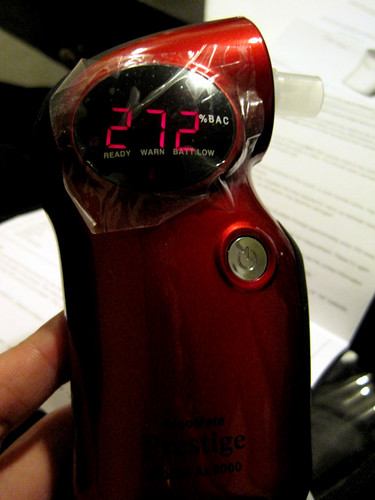Home Breathalyzer Technology
There’s a wide variety of home breathalyzers on the market today and consumers will find two technologies being used: semiconductor-based sensing technology and fuel cell technology. Fuel cell technology is also one of the main choices in law enforcement breathalyzers. It has higher precision and accuracy but many units are too expensive for the home market. They are also bigger than breathalyzers that use semiconductor-based sensing technology.
The Alcomate AL9000 AccuCell Breathalyzer is widely available using this technology and it costs nearly $300. The BACtrack Select S80 Breathalyzer Professional Edition is also a fuel cell unit and it runs around $130 discounted. Prices listed here are online estimates and represent markdowns from original retail prices. The BACtrack Select S75 Pro Breathalyzer also uses fuel-cell technology and is just under $100, but it’s a little wider, longer and heavier than the popular BACtrack Select B50 Breathalyzer, which uses semiconductor-based sensing and costs about $60.
Most consumers don’t want to spend $100, so we’ll look more closely at less expensive units, specifically home breathalyzers that cost less than $70 all the way down to breathalyzers in the ten buck range. And, before we go any further, when using any breathalyzer, you need to wait until at least 20 minutes after your last drink to be sure there’s no alcohol in your mouth to skew the results.
Keychain Breathalyzers
Having a decent breathalyzer on your keychain is a good idea, I suppose, and a few companies have targeted this market niche. BACtrack, Drive Safety, Easy Check and others all have products that are ten dollars or less. However, scanning customer reviews at Amazon.com, none are very highly rated. Most light up a red LED when the blood alcohol level is measured at greater than 0.05.
Handheld Breathalyzers
Metromix Indianapolis reviewed one keychain and two handheld breathalyzers and compared the results to two different police units. The handheld units were the BACtrack B70 ($60) and AlcoHAWK Slim ($40). Both units registered greater than the official police readings. The Backtrack and AlcoHAWK Slim units gave blood alcohol readings of 0.09 and 0.08 respectively while the police units came in at 0.04 on average. The red LED on the keychain model lit up indicating a blood alcohol level greater than 0.05.
From the Metromix tests, it seems that these specific models would protect a user from driving with a blood alcohol level above the legal limit even though their precision and accuracy are somewhat wanting. But users will definitely want units that err on the side of safety rather than push their alcohol consumption as close as they can to the legal limit and then hit the road in their vehicles.
Jon Reiter writes for The Law Office of Andres R. Guevera, a Denver criminal lawyer that provides a free initial consultation, where he can explain your legal options.
No related posts.
 Image Credit
Image Credit Image Credit
Image Credit
